Are You Getting Enough?
The Thoughts of ‘Big Paul’
Are You Getting Enough?
I hear people say, “you don’t need supplements; you can get all the nutrients you need from food.” What may surprise you is that as an owner of a supplement company, I agree that you should be able to satisfy your nutritional needs with food alone. I use the word should, because while in theory this is right, in practice, it can be very difficult.
You may be thinking that we know that the typical modern Western diet tends to contain a lot of processed foods, added sugars, and unhealthy fats, while lacking certain essential nutrients. So, we just need to ensure that we eat a ‘healthy diet’. However, even if your diet appears to be well balanced and nutritious, it may still lack certain important nutrients needed for optimal function or even just to maintain good health.
Now, before I go any further, let me make it clear, that I am not suggesting everyone should suddenly start gulping down handfuls of vitamins and minerals, like I do, but as you shall see as you read this piece, there is definitely a place for supplements when used appropriately.
Let’s begin by looking at why you may not be getting enough nutrients, even if you consume an apparently health diet.
Food isn’t What it Used to Be
Old people often say food doesn’t taste like it used to when they were young. Although this may be just a case of looking back at the past with a rose-tinted view, numerous studies show that many fruits, vegetables, and grains grown today contain less nutrients, including protein and various vitamins and minerals, than those grown just a few decades ago.
This is due to a variety of factors. For example, modern agricultural practices, such as intensive farming and the use of synthetic fertilisers, have led to a loss of essential nutrients in the soil. Consequently, crops grown in nutrient-depleted soil naturally have a lower nutrient content. There has also been a focus on producing high-yield varieties that has often come at the expense of nutrient density, as these crops are bred to grow faster and larger, but may not absorb as many nutrients from the soil. Many foods undergo extensive processing, which strips away vitamins, minerals, and fibre. Long storage times and transportation can lead to nutrient degradation, especially in fresh produce. Some fruit and vegetables literally travel from the other side of the world.
It’s not only plant- based foods that may have reduced nutrient content: The milk from grain fed cows has less omega-3 polyunsaturated fatty acids, and conjugated linoleic acid (CLA) than the milk from traditional grass-fed cows, which has important implications for health. This is why we only use grass-fed dairy protein in our Time 4 Whey Protein Professional.
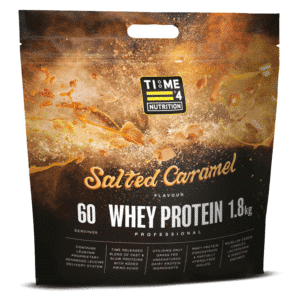
What are we likely to lack?
While it is possible to be deficient in almost any nutrient, I’ve listed below those that tend to be common amongst athletes.
Are You Getting Enough Vitamin D?
The importance of vitamin D and the need for supplementation has gained greater recognition in recent years. This is with good reason, as it plays an essential role in many functions of the body. These include promoting calcium absorption for bone growth and remodelling, the reduction of inflammation, the modulation of cell growth, neuromuscular and immune function, glucose metabolism, and testosterone production. It can help to reduce depression, aid weight loss and play a role in muscle growth and repair. Over 1000 vitamin D–responsive genes have been identified. These affect muscle protein synthesis, muscle strength, muscle size, reaction time, balance, coordination, endurance, inflammation, and immunity, all of which are important for health and athletic performance. Low vitamin D levels are very common, even among athletes, and can have a serious impact on health and performance.
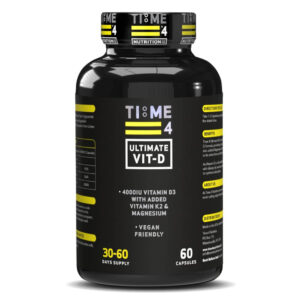
Are You Getting Enough Vitamin K2?
Vitamin K2 is a fat-soluble vitamin that play a role in blood clotting, the maintenance of healthy bone, and the regulation of blood calcium levels. While vitamin D increases the absorption of calcium from the gut into the bloodstream, it is vitamin K2 that ensures this calcium is directed effectively to bones and teeth, where it’s needed, instead of being deposited in the arteries or soft tissues, which can lead to health issues like cardiovascular disease. When it comes to exercise, vitamin K2 is important because it plays a key role in supporting bone strength, cardiovascular health and muscle function. Our Time 4 Ultimate Vit-D also contains vitamin K2.
Are You Getting Enough Magnesium?
Magnesium is a mineral found in all human tissues, especially bone, and is involved in over 300 enzyme reactions and over 600 cellular reactions. It plays an important role in the function of muscle tissue, including reducing muscle cramps, and the nervous system, and energy production. It also contributes to protein synthesis, testosterone production, electrolyte balance, psychological function and the reduction of fatigue. The need to supplement with vitamin D has gain a lot more attention in recent years, but less well-known is that the conversion of vitamin D into its active form for use by the body relies on magnesium. Our Time 4 Ultimate Vit-D also contains magnesium.
Are You Getting Enough Omega-3 Fatty Acids?
Omega-3 fatty acids are essential fats that the body can’t produce on its own, so they must come from food or supplements. They play critical roles in numerous aspects of health and performance, such as brain and heart health, the reduction of inflammation, and muscle growth and maintenance.
The best sources are found in oily fish, which is why it is recommended that we consume at least two portions of fish per week, with at least one being oily. Unfortunately, the majority of the UK population does not consume enough fish, particularly oily fish. Consequently, most people, including athletes, are not achieving the recommended intake.
To make things worse, our diets tend to contain a lot of Omega 6 fatty acids. These are another form of polyunsaturated fatty acid. Their main role is to provide energy. Like Omega-3, they are also essential, and so must be obtained from our diet. While Omega-3 have a potent anti-inflammatory effect, Omega-6 can be proinflammatory. So for good health we need to maintain an optimal dietary intake ratio of Omega-6 to Omega-3 of approximately 1–4:1. The problem is the modern Western diet, has a ratio in the range of 10:1 to 20:1. This imbalance has been accompanied by an increase in chronic inflammatory diseases such as rheumatoid arthritis, cardiovascular disease, non-alcoholic fatty liver disease, inflammatory bowel disease, diabetes, obesity and Alzheimer’s disease. Consequently, by increasing the ratio of Omega-3 to Omega-6 in the Western diet, it believed that we may be able to reduce in the incidence of these serious health problems.
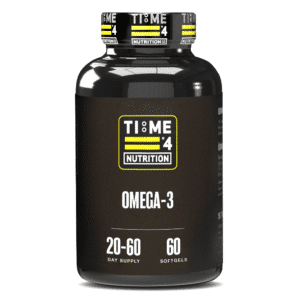
Are You Getting Enough Creatine?
Although you are not likely to be short of creatine, unless you are a vegan or vegetarian, as the richest sources are meat and fish, there are many benefits to supplementing with additional creatine. It is widely recognised for its ability to enhance athletic performance, particularly in high-intensity activities such as resistance training and sprinting. It also helps to increase muscle size, strength and power, and recovery. More than 1,000 studies have investigated the use of creatine supplementation and have identified a range of benefits which go beyond just improving muscular performance. These include enhancing brain function and reducing mental fatigue, and helping to protect against or manage a range of conditions including neurodegenerative disease, such as Parkinson’s, diabetes, osteoarthritis, and various forms of cardiovascular disease. In fact, the evidence for the benefits of creatine is so impressive that some experts now suggest everyone should take it regardless of whether they train or not.
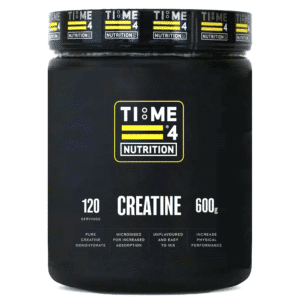
Are You Getting Enough Protein?
You may be surprised to see protein mentioned in this article, as the typical western diet should contain enough protein for needs of the average person. However, it is generally recommended that for building and maintaining muscle mass, an overall daily protein intake in the range of 1.4–2.0 grams per kilogram of body weight per day is needed. So, for example, if you weigh 100kg, you will need to consume 140-200 grams of protein per day. If you are trying to lose body fat and maintain muscle, there is some evidence that up to 3g per kilogram may be optimal. Due to the constraints of a busy lifestyle and perhaps a lack of appetite, this amount of protein can be difficult to consume. This is where a good quality protein supplement, such as Time 4 Whey Protein Professional, can be a valuable addition to your nutrition strategy.
Contrary to the traditional belief, we now know that we need more protein as we get older, not less, and yet our appetite tends to decrease as we age. Again, a good quality protein supplement could provide that extra protein. This can also be beneficial for people on a restrictive diet.
If you are unable to consume dairy protein for whatever reason, an essential amino acids supplement can provide you with the necessary amino acids in a convenient form, which is just like drinking a glass of squash. Interestingly, free-form essential amino acids have been shown to stimulate muscle protein synthesis more than an equivalent amount of intact protein, although a complete protein can provide other benefits.
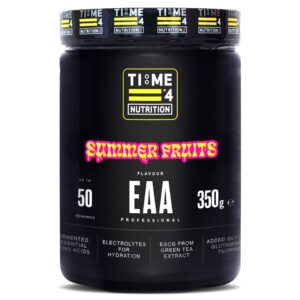
Getting the most from your food: Probiotics and digestive enzymes
Although not technically nutrients, two supplements that are gaining in popularity, with good research to support their use, are digestive enzymes and probiotics.
As the name suggests, digestive enzymes are enzymes, (special proteins) produced by the body to digest food. You may be thinking if my body produces them naturally why would I need to supplement them? In certain situations, our ability to produce digestive enzymes becomes impaired. This in turn will affects our ability to absorb all the nutrients from the food and supplements we consume. For example, as we age enzyme production tends to decline. This becomes more pronounced over the age of 45 years. Chronic stress, poor diet and certain medical conditions can all have a negative impact on our ability to produce and use digestive enzymes effectively.
Typically, in these cases you may experience symptoms such as wind, bloating, indigestion, diarrhoea, constipation, and weight loss due to incomplete digestion. When our food is not completely broken down it can cause irritation in the digestive tract as well as poor nutrient absorption.
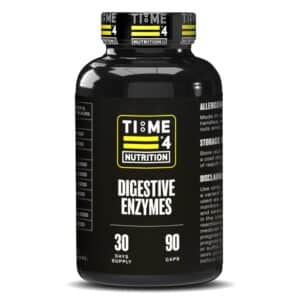
Sticking with the gut, although some bacteria are detrimental to good health, the importance of ‘good’ or ‘friendly’ bacteria is now widely acknowledged, with a range of probiotic food products and supplements available to encourage the growth and maintenance of healthy gut bacteria.
In recent years, it has become clear that good bacteria is not only essential for the normal health and functioning of the gut, but may even affect how we feel, reduce fatigue, help us to maintain a healthy bodyweight, improve athletic performance and even increase muscle mass.
When the friendly bacteria are reduced, the harmful strains and pathogens are allowed to grow unchecked, which can result in an imbalance known as dysbiosis. This can be the result of various issues such as poor diet, antibiotic use, high levels of stress and excessive alcohol consumption.
Dysbiosis can be a much bigger problem than just some mild gut related symptoms, as it is associated with a variety of health issues including irritable bowel syndrome (IBS), inflammatory bowel disease, diabetes, heart disease, rheumatoid arthritis, Parkinson’s disease and certain cancers.
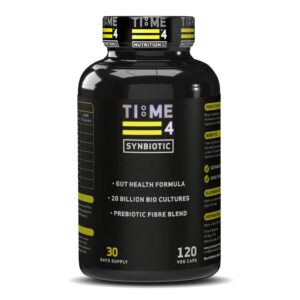
Who is most at risk?
Generally, those at greater risk of deficiency are children, young women, older people, and those individuals on a restricted diet, such as vegetarians, and vegans.
Although the term ‘deficiency’ tends to conjure up images of a skinny, malnourished people, the reality is that even apparently fit and healthy people can have quite severe deficiencies, often without being aware. For example, numerous studies have shown that vitamin D deficiency is common amongst athletes, with 94% of basketball players tested in the US being shown to be deficient.
In theory, despite having a greater need and a higher turnover of key vitamins and minerals athletes should be at a lower risk of nutrient deficiencies because they typically have a greater energy intake. Or in other words, they should be eating more. The problem is that many athletes are poor at satisfying their energy needs, especially female athletes. This can be due to a variety of factors, which combined with the challenges of demanding exercise and greater nutrient requirements, place them at an increased of deficiency.
If you look at the diets of some top bodybuilders, although may they may have all of their macros at optimal levels for muscle growth or getting lean, this can still result in a quite restrictive diet which may lack in certain micronutrients.

Conclusion
In an ideal world, the best way to prevent deficiency is to eat a balanced diet that includes whole, nutrient-dense foods. Unfortunately, we don’t live an ideal world. Even the fittest of us consuming an apparently healthy diet, may have a deficiency we are not aware of yet can impact on our health and performance. You may be a ‘ripped’, 18 stone, red meat eating ‘iron warrior’, but it doesn’t mean that you may not be lacking something. So, although we should always take a ‘food first approach’ to meeting our nutritional needs, supplements may be necessary for those who can’t get enough from diet alone. Remember, the term ‘supplement’ refers to something that is added to something else in order to improve it or complete it. That’s how we should think of nutritional supplements; they are not intended to replace food but just add support when and where it’s needed to complete our nutritional intake.
